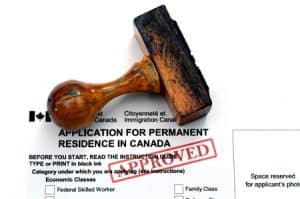[row]
[znhg_column size=”col-sm-6″]
Article Audio:
[/znhg_column]
[/row]
March 1, 2017 – Increased fees and tightening of the rules have resulted in Canadian citizenship application numbers dropping by half between 2015 and 2016, the latest figures show.
In the first nine months of 2016, just 56,446 citizenship applications were submitted to Immigration, Refugees and Citizenship Canada, compared with 111,993 during the same period of 2015.
As recently as 2014, the citizenship fee was $100. The previous Conservative government raised it to $300, and then to $530 in 2015.
The citizenship application fee remains competitive when compared to Canada’s international peers.
In the US, citizenship applicants pay US$725, which works out as roughly CAN$960. In the UK the fee is £1,236 (CAN$2,030), while in Germany it is the equivalent of CAD$360, in Sweden CAD220 and France CAD$77.
 Canadian Citizenship Application Fees
Canadian Citizenship Application Fees
| 2014 and before | $100 |
| 2014 to 2015 | $300 |
| 2015 to present | $530 |
With the numbers dropping off so dramatically in 2016, there are calls for the fees to be returned at least to the $300 level.
Canadian permanent residents enjoy many of the same rights as citizens in Canada, although they are not allowed to vote or run for political office, or hold certain jobs that require a high-level security clearance.
For the rights and obligations of a Canadian permanent resident, click here.
For the rights and obligations of a Canadian citizen, click here.
The previous Conservative government also made number of other citizenship changes in 2014, including introducing the power to strip citizenship from dual nationals.
Bill C-24, the Strengthening Canadian Citizenship Act, saw several changes to the process of granting citizenship, including making children as young as 14 take a test on language and knowledge of Canada and increasing the time a permanent resident needed to live in the country before qualifying.
The Liberals are currently working on a bill to repeal many of the changes under Bill C-6.
Summary of proposed changes under Bill C-6
- Applicants must be permanent residents of and physically reside in Canada for at least 1,095 days (three years) during the five years before the date of their application, and repeals requirement that applicants must be physically present in Canada for at least 183 days in each of the qualifying years.
- Applicants between the ages of 18 and 54 must meet basic knowledge and language requirements. Applicable criteria will be defined under future regulations.
- Repeals a requirement that adult applicants must declare their intent to reside in Canada once they become citizens.
- Restores consideration of time spent in Canada as a non-permanent resident (non-PR) for most applicants to a maximum of one year of credited time.
- Reduces the period to three years for adult applicants to file Canadian income taxes, if required under the Income Tax Act, to be eligible for citizenship.
- Repeals authority to revoke Canadian citizenship from dual citizens who served as members of an armed force of a country or an organized armed group engaged in armed conflict with Canada.
- Repeals authority to revoke Canadian citizenship from dual citizens who are convicted of terrorism, high treason, treason, or spying offences, depending on the sentence received.
- Authorizes Minister to seize documents used in fraudulent citizenship applications.
The federal government said recently that it has no plans to stop revoking citizenships while it decides if it will repeal the law that grants it power to do so.
Despite apparent support from within the Liberal party for the citizenship-stripping law to be changed or revoked – including from Immigration Minister John McCallum – no suspension of the practice will take place.
Currently the government can take away the citizenship of anyone accused of mispresenting themselves in order to get access to Canada, without the need for a hearing.
Bill C-6 is expected to come into force before Canada Day, July 1, 2017.
Interested employers: Kindly contact us here to receive further information.
Interested candidates: Find out whether you qualify to Canada by completing our free on-line evaluation. We will provide you with our evaluation within 1-2 business days.
Read more news about Canada Immigration by clicking here.




